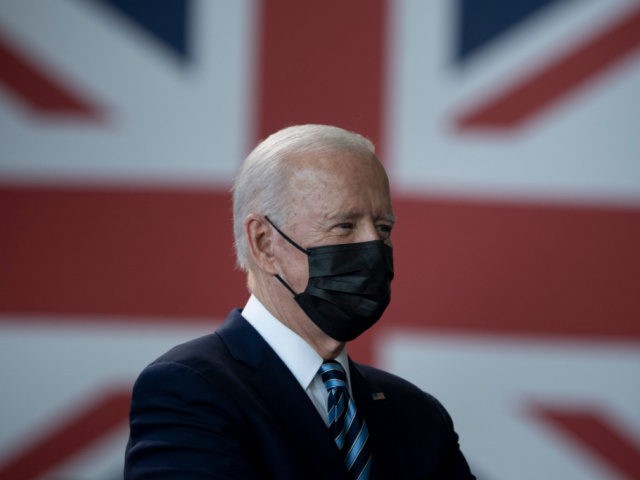China’s rubber-stamp legislature, the National People’s Congress (NPC), passed a much-ballyhooed law on Thursday that will supposedly “block” all human-rights sanctions leveled against the brutal Communist regime by threatening foreign governments with automatic retaliation.
The move sent menacing signals to foreign officials and international corporations just as President Joe Biden arrived in Europe for the G7 summit.
As China’s state-run Global Times put it:
Top lawmakers in China on Thursday voted to pass the highly expected Anti-Foreign Sanctions Law, providing a comprehensive legal basis for blocking illegal foreign sanctions and preventing Chinese individuals and entities from suffering the damage resulting from such illegal sanctions. The new law will also offer a sufficient legal foundation for taking an equal position with the West by imposing necessary countermeasures.
According to the Global Times, the “highly expected law, which is considered an effective and strong legal tool to stop the long-arm jurisdiction of foreign countries,” empowers various authorities to target foreign corporate entities, individuals, and even their “relatives” and “spouse” with retaliatory measures, including “refusing to issue visas or denying entry, deportation, freezing properties and restricting relevant transactions and cooperation.”
Chinese citizens and organizations who feel aggrieved may also file lawsuits against foreign entities to “seek compensation for losses” due to human rights sanctions. The NPC listed the oppression of Tibet and Hong Kong, China’s threats against Taiwan, Chinese territorial aggression in the South China Sea, and China’s responsibility for the worldwide coronavirus pandemic as subjects that would trigger punitive retaliation under the new law, should foreigners dare to raise them.
“The law precisely and effectively targets those who have taken unilateral sanctions in hurting China’s interests, and this targeted group can be expanded to their relatives or organizations, which would have strong deterrent effect,” China University of Political Science and Law Professor Huo Zhengxin said.
Although Chinese state propaganda portrayed the law as a major new initiative that would forever change the geopolitical landscape by bringing unprecedented pressure to bear against foreign officials, businessmen, and their families, Radio Free Asia (RFA) noted the gangster government in Beijing has already retaliated extensively against private and government critics of its human rights abuses:
Some sanctions target the Political and Security Committee of the Council of the European Union, the Subcommittee on Human Rights of the European Parliament, the Mercator Institute for China Studies in Germany, and the Alliance of Democracies Foundation in Denmark.
China’s Foreign Ministry has also designated members of the U.S. Commission on International Religious Freedom, Canadian lawmaker Michael Chong and the House of Commons Foreign Affairs subcommittee on human rights for retaliatory visa and financial sanctions related to Xinjiang.
And on March 17, one day before a high-level bilateral meeting in Alaska, U.S. Secretary of State Antony J. Blinken announced sanctions against 24 Chinese officials for their efforts “to unilaterally undermine Hong Kong’s electoral system” by enacting amendments to screen legislative candidates for their allegiance to Beijing.
Feng Chongyi, University of Technology Sydney professor of Chinese studies, suggested to RFA that China’s “new law” and hyperventilating state media coverage of it, could be more about posturing, tossing out some nationalist red meat, and reassuring nervous Chinese officials that Beijing has their backs.
“They tend to greatly overestimate Xi Jinping’s power and prestige, and China’s strength. They believe they are really powerful, to the point of self-delusion,” Feng said of the Chinese Communist Party (CCP) worldview, adding, “They impose sanctions on Australia and the European Union because they believe that the EU and Australia are heavily dependent on China.”
Even with all of the legalese pouring from the NPC and the breathless promotion from Chinese state media, foreign observers noted the specifics of what the anti-sanctions law will actually do remain unclear.
Bloomberg News speculated the law might be intended to terrorize multinational corporations out of cooperating with Western sanctions, fearing that China will seize their assets, shut down their supply chains, or lock them out of lucrative Chinese markets. One of the notable features of the anti-sanctions law is dramatically expanding the number of Chinese entities that can impose retaliatory measures or file lawsuits against foreign corporations with assets in China that could be seized.
The implicit threat to multinationals is that swarms of Chinese agencies, all the way down to local government officials and compensation-seeking Chinese businesses, will be unleashed against them if they comply with sanctions against Beijing issued by the U.S., U.N., or European governments.
“Chinese experts say the law could dampen the climate for foreign investment, but that the Chinese government would have calculated this is a price worth paying to safeguard the country’s interests,” Reuters observed.
China passed this law just as U.S. President Joe Biden arrived in Europe for meetings at which he is supposed to rally Western resistance to China and Russia. Chinese state media spent the week sneering that Biden’s mission is doomed since the U.S. no longer has the power to contain or punish China or forge a durable Atlantic alliance against Beijing’s growing economic might.

COMMENTS
Please let us know if you're having issues with commenting.